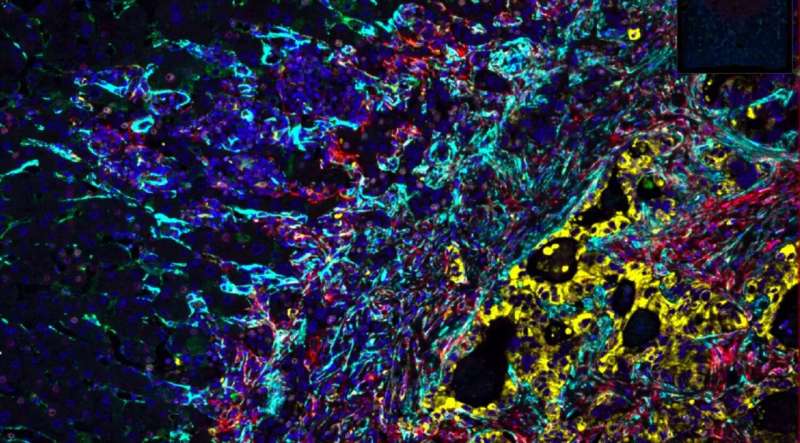This article has been reviewed according to Science X's editorial process and policies. Editors have highlighted the following attributes while ensuring the content's credibility:
fact-checked
peer-reviewed publication
trusted source
proofread
Researchers find capsules surrounding liver metastases of colorectal cancer are a healing response by the liver

A study by researchers from Karolinska Institutet and physicians from Karolinska Hospital shows that a capsule of connective tissue around liver metastases from colorectal cancer improves patient survival and represents a healing response by the liver, not a phenomenon caused by the tumor itself.
Metastases in the liver are common in many cancer types. Microscopic investigation of the invasion front of liver metastases has revealed distinctly different tissue architectures: Some metastases are surrounded by a capsule of connective tissue, while in others, tumor cells make direct contact with the liver cells. Patients whose metastases are surrounded by connective tissue have significantly superior survival.
Despite its strong impact on survival, the origin of the surrounding capsule has been unclear. The team of Marco Gerling's group at the Department of Biosciences and Nutrition, Karolinska Institutet, used clinical samples from patients with liver metastases to trace the origins of the capsule. They found that the capsule is similar to the type of liver fibrosis that develops in patients with non-cancer liver disease, where it develops as part of a reparative process. Using mouse models, they showed that the capsule develops when cancer cells fail to invade and replace healthy liver tissue.
Close collaboration between researchers and clinicians
"The collaborations between our basic research lab and the surgeons and pathologists at Karolinska University Hospital were instrumental for this study," says Marco Gerling, the lead author.
"We could connect observations made by our collaborating pathologists (Béla Bozóky and Carlos Fernández Moro) with extensive clinical data and functional studies in novel mouse models," he continues. "For the future, we are excited to learn more about how cancer cells invade into healthy tissue and we hope to soon learn how to inhibit this process to the benefit of our patients. I cannot stress enough that solving important questions in cancer research requires a close and constant exchange between basic researchers and clinicians."
Published in Nature Communications, the results are the first from the KaroLiver patient cohort, which includes more than 700 patients with liver metastases from colorectal cancer operated on at Karolinska University Hospital. The KaroLiver investigators are Jennie Engstrand (consultant surgeon and postdoc), Carlos Fernández Moro (consultant pathologist and postdoc) and Marco Gerling (resident physician in oncology and research group leader).
More information: Carlos Fernández Moro et al, An idiosyncratic zonated stroma encapsulates desmoplastic liver metastases and originates from injured liver, Nature Communications (2023). DOI: 10.1038/s41467-023-40688-x



















